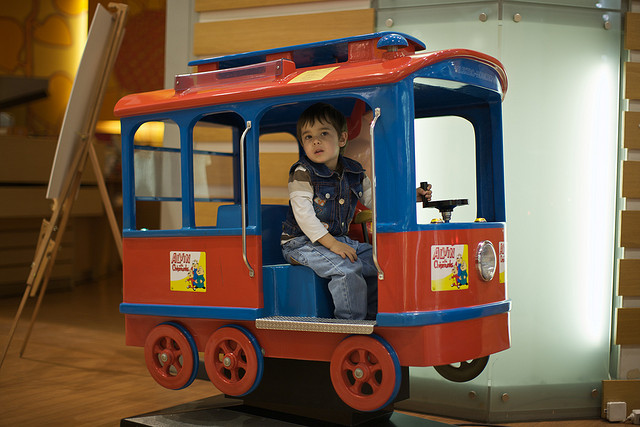“Humans aren’t as good as we should be in our capacity to empathize with feelings and thoughts of others, be they humans or other animals on Earth. So maybe part of our formal education should be training in empathy. Imagine how different the world would be if, in fact, that were ‘reading, writing, arithmetic, empathy.”
~ Neil deGrasse Tyson
When Ryan was five, his destructive behaviors escalated and he always appeared to be crawling out of his skin.
He was never still, never comfortable, never happy, never sleeping, always angry and extremely physically aggressive. He punched, hit, bit, spit, kicked—all of the time. We still have scars, (both emotional and physical) from that time.
One thing that would temporarily soothe him was motion: riding in a car, a swing, being on a train or pulled in a wagon. The movement somehow helped to center the frequent sensory explosions that came at him from the world.
One day, I took him to a mall as they had a train set up for kids and I wanted to see if he would enjoy it. Part of me was desperate for Ryan to experience some “typical” activities that other children his age engaged in. I intentionally selected a day during the week, when it would be less crowded and was greeted in an incredibly harsh way by the gentleman running the train (let us call him Caldwell, which in translation means near a cold well, which is what I would have liked to have shoved him down).
Caldwell looked tired and angry and was not the type of person who should be interacting with children. I should have listened to the maternal instinct inside of me that recognized the emotional red flags but getting Ryan out of the house at that time was such an exhausting accomplishment, I stubbornly decided that mean man or not, my son would ride that train.
As soon as the train started, Ryan started stimming.
For those who don’t know, self-stimulatory behavior, also known as “stimming” and self-stimulation, is the repetition of physical movements, sounds or repetitive movement of objects common in individuals with developmental disabilities, but most prevalent in people with autism. In Ryan’s case, when he is happy, he flaps his arms and bounces up and down and makes loud sounds.
The very second Ryan started bouncing, Caldwell ran (literally, ran) over to him (as the train was moving) and screamed at him to “sit down!”
At first Ryan didn’t realize Caldwell was directing this verbal attack at him but it happened repeatedly, until finally his tone and close proximity scared Ryan, who immediately started to melt down. I have been able to exhibit patience and professionalism in the face of adversity many times in my life—this was not one of those occasions.
I ran like hell toward my son, grabbed him off the moving train (Caldwell was now yelling at me) and waited until the ride was over. When it was, I approached him with my screaming child in my arms, (who was at this point pulling my hair, biting my face and crying in sheer terror). I explained to him that Ryan had special needs and he was excited to be on the train, his bouncing was “stimming” which meant that for a few minutes, he was comfortable and happy. I wanted to try putting him on the train again but Caldwell said no.
His words and I quote: “retarded kids shouldn’t be riding my train.”
It was one of those surreal moments where the room stops and things go silent. I really couldn’t absorb his words and kept thinking “did he really just say that?” When I came to, the Jersey girl inside of me exploded and I lost it. I wasn’t patient or professional in my delivery.
Ryan continued his aggression and there was a small crowd emerging (this was before cell phones or all of this would have gone viral on You Tube) and while I felt humiliated and wanted to leave, I also felt paralyzed. Caldwell walked away from me while I was screaming at him and I just sat on the floor and started to cry, I mean really cry—sloppy crying. This only exacerbated Ryan’s emotional breakdown and boy were the two of us a sight. I still have the scar on my leg from where he kicked me and drew blood.
It was at this moment that a woman came over to me (let’s call her Madison which in translation means Gift of God, which she was for me on this day).
She hadn’t seen what had happened but saw me on the ground sobbing with a hysterical child in my arms and blood coming through my pants. Madison sat down next to me and started talking in a soothing voice to me but all the while looking at Ryan.
She told me in this soft, hypnotic voice that she was the mother of a child with cerebral palsy who lived her life in a wheelchair and she had a couple of hours to herself each day and she often came to the mall. As she told us her story, she handed Ryan some chips and he began to calm down and I told her what happened. She stood up, took my hand, and led me right to the general offices in the mall.
Madison demanded to see a manager and told him the story of Caldwell and Ryan and the train incident. The manager instantly retrieved Caldwell, demanded that he apologize to me and told me that he would be “severely reprimanded.” I of course insisted that he be fired and threatened to call my attorney.
The manager handled me well. He told me that he “could only imagine” how hard things were and how hurt my feelings must be. He gave me his business card, a $100 mall gift card, patted Ryan on the head (FYI: never do that to a child with autism) and told me to please come back to the train and give it another try, anytime and for free.
Madison stayed with me through this ordeal and when we said goodbye she said something that I will never forget.
“You can’t expect people who don’t experience the pain that we do on a daily basis, to get it the way that we do. Only other parents like us can truly empathize.”
I didn’t recognize it at the time but in this one traumatic event, I experienced both sympathy and empathy. Caldwell was a terrible person, the mall manager sympathized with the situation and Madison knew how to help me because she was able to experience true empathy for me.
Madison’s words have stuck with me over the years as I often find it difficult to empathize with people in situations that don’t rise to the level of autism. It is difficult to get to the pain of someone who is complaining about something that I see as routine.
Terrible two’s? Try dealing with a two-year-old in a 10-year-old’s body. Your child got in trouble at school for talking in class? At least he knows how to talk. Your kids are fighting? At least they engage with each other…and the list goes on and on.
It becomes isolating for a special needs parent to be around parents of typical children because these everyday conversations come up and you can’t participate. While some parents are struggling with bedtime routines or attachment issues,we are struggling with everything.
Attachment issues? Please. I have never heard my son call me “mom” or say “I love you.” Bring up the Caldwell and the train story at a play-date and you can only imagine how awkward it becomes. Sympathy, pity, discomfort all over the place—but not empathy.
As a teacher and school administrator, I felt a special connection to my students and families affected by disabilities. Some would say at times I favored them—that was my empathy shining through. As a special needs attorney, I will organically empathize with clients and families and I believe that will enable me to serve them at a deeper level.
Dr. Daniel Goleman, a famous psychologist and author on emotional intelligence, wrote that “a prerequisite to empathy is simply paying attention to the person in pain.” I try to do this each and every day with everyone I encounter. It comes naturally to me in some situations and is more challenging in others. But I pay attention to people’s pain.
Madison taught me to seek out my fellow special needs warriors and be there for them.
I pay her empathy forward as often as I am able to. I urge anyone reading this to pay attention to the special needs families in your own communities, at your schools, at your restaurants and especially those melting down publicly somewhere at a mall, grocery store or Target. We are everywhere and if you show the slightest bit of kindness towards us, even if you can’t quite understand our pain, we will never forget it or you.
Relephant read:
How to Love Someone on The Autistic Spectrum.
Author: Melissa Gagne
Editor: Catherine Monkman








Read 8 comments and reply